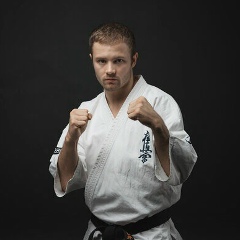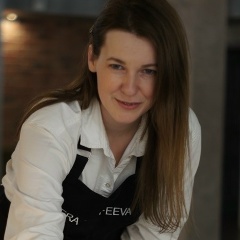В июне у Сергея Лукьяненко вышла новая книга. Она называется «Порог». И у нее есть гигантская проблема. Пока это только огрызок, вступление к истории, которой нет. Вместо полноценного романа нам кидают затравку на триста с чем-то страниц.
В то время Симмонс смеется, дескать, ему приходится делить свои романы на две части, поскольку 1600 страниц не влезают под одну обложку, самый кассовый российский фантаст начинает космический сериал работой, у которой все сюжетные ветки заканчиваются клиффхэнгером.
«Порог» это даже не первый сезон сериала с завязкой, конфликтом, кульминацией и финалом. Это, скорее, первая серия, где дается только экспозиция, кое-какое развитие героев и все.
В этом состоит главное разочарование. Ты пытаешься понять, к какой мысли тебя подводили, о чем ты только что прочитал, но вместо этого успеваешь только запомнить россыпь главных героев — притом не самых понятных, суматошных и совершенно лишенных ясной цели.
Но есть у «Порога» и подкупающая сторона.
Это очень необычная для Сергея Васильевича книга — по стилю, по работе с материалом, по подаче самой истории. В ней автор будто учиться по-новому для себя писать.
Раньше в большинстве книг Лукьяненко было линейное повествование и один единственный герой, от лица которого и шел рассказ. Из-за схожести лирических героев писателя можно было обвинить в самоповторах, в том, что он по сути пишет одну книгу в разных сеттингах.
С «Порогом» все иначе. По оформлению, по тому, как построена работа над сценами, как они чередуются, кидая читателя от героя к герою, книга больше всего напоминает «Новую луну» Йена Макдональда. Там тоже множество акторов, работающих на единую масштабную историю.
В новых, поставленных им же самим условиях работать писателю не очень комфортно. Он не позволяет себе ни быстрого развития событий, ни экшна, ни каких-то очень неожиданных, все меняющих поворотов.
Новый выбранный набор инструментов, возможно, и есть главный сдерживающий фактор. И если с одной стороны — это вызов и развитие писателя, то с другой — новый резец как будто не позволяет Лукьяненко «заварить кашу» прямо сейчас.
Когда оперируешь десятком героев, тремя основными сюжетными линиями — по щелчку так сделать нельзя. Это не «Линия грез», когда героя швыряло от планеты к планете, от схватки к схватке. Тут другое, тут у тебя все нити по предварительному плану должны сплестись в аккуратное руно.
Это не делает книгу скучной, хотя первая половина с непривычки у меня пошла туго, но делает неторопливой, слишком размеренной, заставляющей постоянно думать «Ну когда же начнет история?», а ее все нет и нет до последних страниц, когда писатель объявляет, что ты прочел конец первой части.
И, вроде, неплохо провел время, и за писателя, который вернулся к космосу и к экспериментам со стилем безумно рад, но все равно чувствуешь себя обманутым.
В то время Симмонс смеется, дескать, ему приходится делить свои романы на две части, поскольку 1600 страниц не влезают под одну обложку, самый кассовый российский фантаст начинает космический сериал работой, у которой все сюжетные ветки заканчиваются клиффхэнгером.
«Порог» это даже не первый сезон сериала с завязкой, конфликтом, кульминацией и финалом. Это, скорее, первая серия, где дается только экспозиция, кое-какое развитие героев и все.
В этом состоит главное разочарование. Ты пытаешься понять, к какой мысли тебя подводили, о чем ты только что прочитал, но вместо этого успеваешь только запомнить россыпь главных героев — притом не самых понятных, суматошных и совершенно лишенных ясной цели.
Но есть у «Порога» и подкупающая сторона.
Это очень необычная для Сергея Васильевича книга — по стилю, по работе с материалом, по подаче самой истории. В ней автор будто учиться по-новому для себя писать.
Раньше в большинстве книг Лукьяненко было линейное повествование и один единственный герой, от лица которого и шел рассказ. Из-за схожести лирических героев писателя можно было обвинить в самоповторах, в том, что он по сути пишет одну книгу в разных сеттингах.
С «Порогом» все иначе. По оформлению, по тому, как построена работа над сценами, как они чередуются, кидая читателя от героя к герою, книга больше всего напоминает «Новую луну» Йена Макдональда. Там тоже множество акторов, работающих на единую масштабную историю.
В новых, поставленных им же самим условиях работать писателю не очень комфортно. Он не позволяет себе ни быстрого развития событий, ни экшна, ни каких-то очень неожиданных, все меняющих поворотов.
Новый выбранный набор инструментов, возможно, и есть главный сдерживающий фактор. И если с одной стороны — это вызов и развитие писателя, то с другой — новый резец как будто не позволяет Лукьяненко «заварить кашу» прямо сейчас.
Когда оперируешь десятком героев, тремя основными сюжетными линиями — по щелчку так сделать нельзя. Это не «Линия грез», когда героя швыряло от планеты к планете, от схватки к схватке. Тут другое, тут у тебя все нити по предварительному плану должны сплестись в аккуратное руно.
Это не делает книгу скучной, хотя первая половина с непривычки у меня пошла туго, но делает неторопливой, слишком размеренной, заставляющей постоянно думать «Ну когда же начнет история?», а ее все нет и нет до последних страниц, когда писатель объявляет, что ты прочел конец первой части.
И, вроде, неплохо провел время, и за писателя, который вернулся к космосу и к экспериментам со стилем безумно рад, но все равно чувствуешь себя обманутым.
In June, Sergei Lukyanenko published a new book. It is called the Threshold. And she has a giant problem. So far this is only a stub, an introduction to a story that does not exist. Instead of a full-fledged novel, they throw us a seed for three hundred pages of something.
At that time, Simmons laughs, they say, he has to divide his novels into two parts, since 1600 pages do not fit under one cover, the highest-grossing Russian science fiction writer begins a space series with a work in which all story lines end with a cliffhanger.
"Threshold" is not even the first season of the series with the eyeballs, conflict, climax and ending. Rather, this is the first series where only the exposition is given, some development of the heroes and that’s all.
This is the main disappointment. You are trying to understand what thought you were led to, what you just read about, but instead you only manage to remember the scattering of the main characters - moreover, not the most understandable, hectic and completely devoid of a clear goal.
But the "Threshold" has a bribing side.
This is a very unusual book for Sergei Vasilievich - in style, in working with material, in presenting the story itself. In it, the author seems to learn to write in a new way for himself.
Previously, in most of Lukyanenko’s books there was a linear narrative and one single hero on whose behalf the story went. Due to the similarity of the lyrical heroes of the writer, one could be accused of self-repeating, of the fact that he essentially writes one book in different settings.
With the "Threshold" everything is different. By design, by how the work on the scenes is structured, how they alternate, throwing the reader from hero to hero, the book most closely resembles Ian MacDonald’s New Moon. There are also many actors working on a single large-scale story.
In the new conditions set by himself, the writer is not very comfortable working. He does not allow himself neither the rapid development of events, nor action, nor any very unexpected, all-changing turns.
The newly selected toolkit may be the main deterrent. And if, on the one hand, this is a challenge and development of the writer, on the other, the new cutter does not seem to allow Lukyanenko to “make some porridge” right now.
When you operate with a dozen heroes, three main storylines - you can’t do it by clicking. This is not a "Line of Dreams" when a hero is thrown from planet to planet, from battle to battle. Here is another, here you have all the threads according to the preliminary plan should weave into a neat fleece.
This does not make the book boring, although the first half of my habit has gone tight, but it makes it leisurely, too measured, which makes me constantly think, “When will the story begin?”, And it’s all gone until the last pages, when the writer announces that you read the end of the first part.
And, like, I had a good time, and for a writer who returned to space and to experiment with style, he is extremely happy, but you still feel cheated.
At that time, Simmons laughs, they say, he has to divide his novels into two parts, since 1600 pages do not fit under one cover, the highest-grossing Russian science fiction writer begins a space series with a work in which all story lines end with a cliffhanger.
"Threshold" is not even the first season of the series with the eyeballs, conflict, climax and ending. Rather, this is the first series where only the exposition is given, some development of the heroes and that’s all.
This is the main disappointment. You are trying to understand what thought you were led to, what you just read about, but instead you only manage to remember the scattering of the main characters - moreover, not the most understandable, hectic and completely devoid of a clear goal.
But the "Threshold" has a bribing side.
This is a very unusual book for Sergei Vasilievich - in style, in working with material, in presenting the story itself. In it, the author seems to learn to write in a new way for himself.
Previously, in most of Lukyanenko’s books there was a linear narrative and one single hero on whose behalf the story went. Due to the similarity of the lyrical heroes of the writer, one could be accused of self-repeating, of the fact that he essentially writes one book in different settings.
With the "Threshold" everything is different. By design, by how the work on the scenes is structured, how they alternate, throwing the reader from hero to hero, the book most closely resembles Ian MacDonald’s New Moon. There are also many actors working on a single large-scale story.
In the new conditions set by himself, the writer is not very comfortable working. He does not allow himself neither the rapid development of events, nor action, nor any very unexpected, all-changing turns.
The newly selected toolkit may be the main deterrent. And if, on the one hand, this is a challenge and development of the writer, on the other, the new cutter does not seem to allow Lukyanenko to “make some porridge” right now.
When you operate with a dozen heroes, three main storylines - you can’t do it by clicking. This is not a "Line of Dreams" when a hero is thrown from planet to planet, from battle to battle. Here is another, here you have all the threads according to the preliminary plan should weave into a neat fleece.
This does not make the book boring, although the first half of my habit has gone tight, but it makes it leisurely, too measured, which makes me constantly think, “When will the story begin?”, And it’s all gone until the last pages, when the writer announces that you read the end of the first part.
And, like, I had a good time, and for a writer who returned to space and to experiment with style, he is extremely happy, but you still feel cheated.
У записи 2 лайков,
0 репостов,
228 просмотров.
0 репостов,
228 просмотров.
Эту запись оставил(а) на своей стене Александр Семенов























